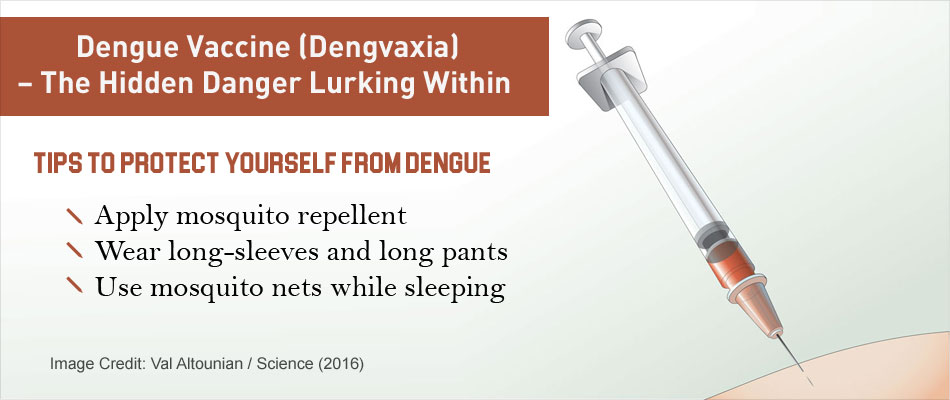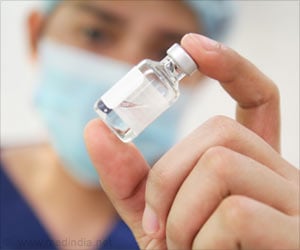
- Dengue, a mosquito borne viral infection affects nearly 400 million persons globally every year, killing around 25,000 persons.
- A new three dose vaccine has recently been developed to prevent Dengue.
- WHO recommends that the vaccine should be used only in areas where there is ‘a high burden’ of the disease.
- Before taking the vaccine a blood test should be done to find out if there is evidence of a prior infection. This test makes the vaccine safer to use.
How the Vaccine Acts within the Body
The vaccine would act like a natural infection, but without causing the symptoms of the illness.
For instance, in persons who have been previously infected with the Dengue virus, the vaccine acts like a second infection that is mild and asymptomatic, unlike a naturally occurring second infection that causes serious effects.
On the other hand, in a person previously uninfected by the virus, the vaccine acts as the first infection, and a second natural infection occurring at a later date will be more severe and may need hospitalization.
One of the chief concerns of scientists developing the vaccine was its safety, and how to overcome the risk of serious infection that could occur in some individuals.
Using the available data, they created mathematical models that would indicate the efficacy of the vaccine in countries with different rates of transmission of the infection, namely low, moderate and high.
The results showed that the vaccine would be effective in reducing the incidence of infections and hospitalizations by 20 to 30 percent in areas where there was a high transmission rate of Dengue.
On the other hand, in areas with a lower transmission rate of the virus, the vaccine significantly increased the incidence of severe infections and hospitalizations.
Suggested Recommendations on using the Vaccine
Presently, the Dengvaxia vaccine is the only one approved and available to control the spread of Dengue.
"In vaccines you hope for more than 30 percent success, but it's the only vaccine available right now to slow dengue," says Isabel Rodriguez-Barraquer, MD, PhD, MHS, a research associate at the Bloomberg School and one of the study's lead authors.
Scientists therefore recommend that the vaccine be used only after carefully
weighing the risks against the benefits. It should only be administered when there is enough evidence that it will do more good than harm.
The makers of the vaccine too acknowledge the fact that the vaccine is not very effective in persons not previously infected. The vaccine should not be used in children less than nine years of age since it is unlikely that they have been previously exposed to the virus.
"We should be careful in considering where and how to use this vaccine as there is still uncertainty about its impact," says Derek A.T. Cummings, PhD, a professor of biology at the University of Florida and an adjunct professor at the Bloomberg School and another of the study's authors.
Based on these findings, the WHO is recommending that the vaccine be used only in areas where there is ‘a high burden’ of the disease.
"Having a vaccine is a significant step forward for dengue control," Rodríguez-Barraquer says. "However, this vaccine is a prime example of having to seriously weigh the risks and benefits."
Something that would help make the decision whether or not to have the vaccine would be to undergo a blood test that would reveal evidence of a prior infection.
If a person has evidence of prior infection, it is safe to get vaccinated; if there is no evidence of previous infection, they should not get vaccinated.
About Dengue Fever
Dengue is a mosquito borne disease caused by the Dengue virus, affecting a large global population in tropical countries. It causes high fever with severe headaches, muscle and joint pains, pain behind the eyeballs and rashes on the limbs and trunk. It is usually accompanied by a low platelet count and low white cell count.
Most persons recover without sequelae, but a small percentage develop the more serious Dengue hemorrhagic fever associated with circulatory collapse and shock referred to as the Dengue Shock Syndrome. It may be fatal if prompt treatment is not instituted.
Why Secondary Infections are Serious – Virus Tricks the Immune System
There are four types of Dengue virus that differ slightly in the proteins on their surface.
Typically, a first time infection is mild and the patient recovers completely. However, if a person becomes infected a second time with a different type of the virus, it leads to a much more serious form of the disease called Dengue Hemorrhagic Fever that could be fatal in some cases.
Following infection with one type of Dengue virus, the immune system reacts normally by forming antibodies to fight the infection.
When another infection occurs a second time, the antibodies get confused when faced with an unfamiliar strain of the virus. Instead of fighting the infection, the antibodies actually help the virus to attack the immune system, leading to serious illness.
The authors of the study hope that the findings and results of their analysis be borne in mind by policy makers whilst evaluating this as well as other candidate Dengue vaccines.
References:
- Dengue fever - (https://en.wikipedia.org/wiki/Dengue_fever#Vaccine)
- Dengue stronger the second time round - (http://www.denguevaccines.org/dengue-stronger-second-time-round)
Source-Medindia













